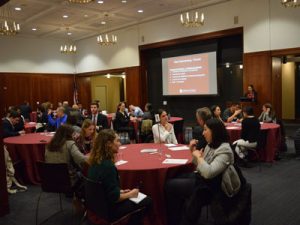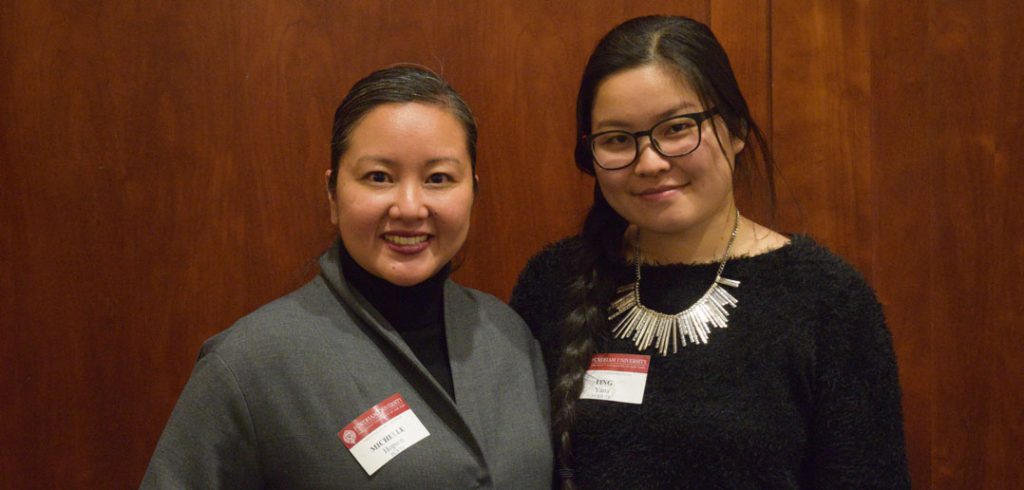Enter the Fordham Mentoring Program. Now in its 15th year, the program connects alumni with current students in an effort to provide young professionals with someone they can turn to for guidance in their future careers.
A joint venture between the offices of Career Services and Alumni Relations, the program runs from October to May. Mentors are asked to commit to 24 hours a year with the intention of providing a few hours each month. Alumni from every undergraduate, graduate, and professional school can participate as mentors, and the program is open to all juniors and seniors.
What started with just a few dozen mentors in its first year has grown to include 216 alumni—and a host of success stories.
Preparing for the Professional World
Alumni mentors do everything from reviewing student resumes to attending networking events. There are also three annual events each year that mentors and mentees are encouraged to attend: a meet and greet, a networking skills workshop, and a mentor appreciation reception.
On Jan. 22, the program hosted this year’s networking skills workshop at the Lincoln Center Campus.
Spearheaded by Matthew Burns, FCRH ’13, assistant director for young alumni and student engagement, and Megan McDonald, FCRH ’14, assistant director of employer relations, the event began with a short presentation on general interviewing tips by Annette McLaughlin, director of career services.
McLaughlin, who worked in recruiting for several years, stressed the importance of preparation—researching and learning as much as possible about a company before interviewing. A candidate should also know what is important to them in a job, she said, practice their interviewing skills, and remember to relax during the interview.

To offer some hands-on practice, the workshop consisted of a mock interview session focused on finessing a student’s interviewing skills. Mentor-student pairs sat at round tables for seven-minute “interviews,” with time allotted for introductions, one question, answers, and feedback. Students rotated seats when their time was up and continued doing so until the end of the workshop.
The workshop was just one of many ways the program strives to give students tools for their future early on in their careers.
“This program is unique in that it’s an opportunity for Fordham students to interact with alumni in a way that is guaranteed to provide career guidance and support before they begin their own career journey beyond Fordham’s gates. Many students crave such networking opportunities but don’t feel comfortable reaching out on their own, so the Mentoring Program initiates those relationships for them and coaches them on how to maintain a mentoring relationship for the duration of the program and after,” said McLaughlin.
Life Lessons From Experienced Mentors
Alumna Michelle Hopson, PCS ’08, and current Fordham College at Rose Hill senior Wanida “Ting” Yana were matched up as mentor and mentee last October. Yana, an international studies major with a double minor in sociology and humanitarian studies, was pleased to be matched up with Hopson, who works as a consultant for nonprofit organizations.
“She’s given me a lot of helpful advice because she’s also a consultant, which is one of the things I aspire to be. It was really good to be able to hear from someone who actually works in the career that I want to be [in],” Yana said of her mentor.
Yana also found common ground in their similar backgrounds, commenting that “Michelle’s ethnically Filipino and I’m from Thailand, so we both have that international background in a way. So it was easy to bond over that.”
Hopson, who has been involved in the program for several years, finds real value in imparting her wisdom onto current students. She said she employs a hands-off strategy as a mentor: “I’m not there to do any work … but really coaching, motivation, giving the tools, giving the resources.” She said she helps students through a variety of issues, “from the decision about the next step and going to school internationally, to what type of industry they should be in, to the day-to-day questions, like how do I deal with this boss who’s like this.” With these skills, Hopson hopes to give her mentees the tools to effectively and independently solve their problems.
The Benefits of Being a Mentor
Students are not the only ones who benefit from the program. Hopson says that thanks to her mentees, she has continued on her journey of being a lifelong learner.
“I always tell myself I mentor because I want to learn … I wanted to bring back the things that helped me become who I am. I had a mentor myself and I knew with just these life skills, and practical wisdom, and these strategies, I was able to be where I was, where I am today.”
One success story from the program comes from a mentor-mentee pair that have been in touch for nearly a decade. Christopher Gullotta, FCLC ’82, and Brandon Brown, GABELLI ’10, met in fall 2009 when they were matched up by the mentoring program.
According to Gullotta, Brown was at a major crossroads when they were first matched up as a pair. Brown was a scholarship athlete on Fordham’s football team who was considering a career in law after realizing the NFL was becoming less of a possibility. With Gullotta’s guidance, Brown ended up going to law school and now serves as the assistant director of pro scouting with the Philadelphia Eagles. The men have remained close friends.
“My wife and children have come to know Brandon well. We attend each other’s significant family gatherings. And I go to Philadelphia every year to visit with Brandon and catch an Eagles game,” said Gullotta.
Gullotta wanted to become a mentor after two of his professors, John Adam, S.J., and philosophy professor Bernard Gilligan, took a special interest in him. “[They] helped me develop the critical thinking and advocacy skills that I would not have survived without in law school or in private practice. They embodied the spirit of Fordham, and I try to do likewise.”
Hopson continues to be a mentor in the “Fordham way,” she said. “You are out there continuing to develop yourself, continuing to be a critical thinker, continuing to reflect, to compare yourself not to anybody else but to who you were yesterday, to keep growing, to keep burning off all that stuff that didn’t work, that worked yesterday and no longer works for today, and not getting stuck in the past. That’s really what growth is about and that’s, for me, what Fordham kind of equals.
“I took a train here, took two subways and I’d still do it every day if needed after a full day of work and talking to clients and doing all that stuff. It’s so rewarding and I know there’s a place for people like me here.”

